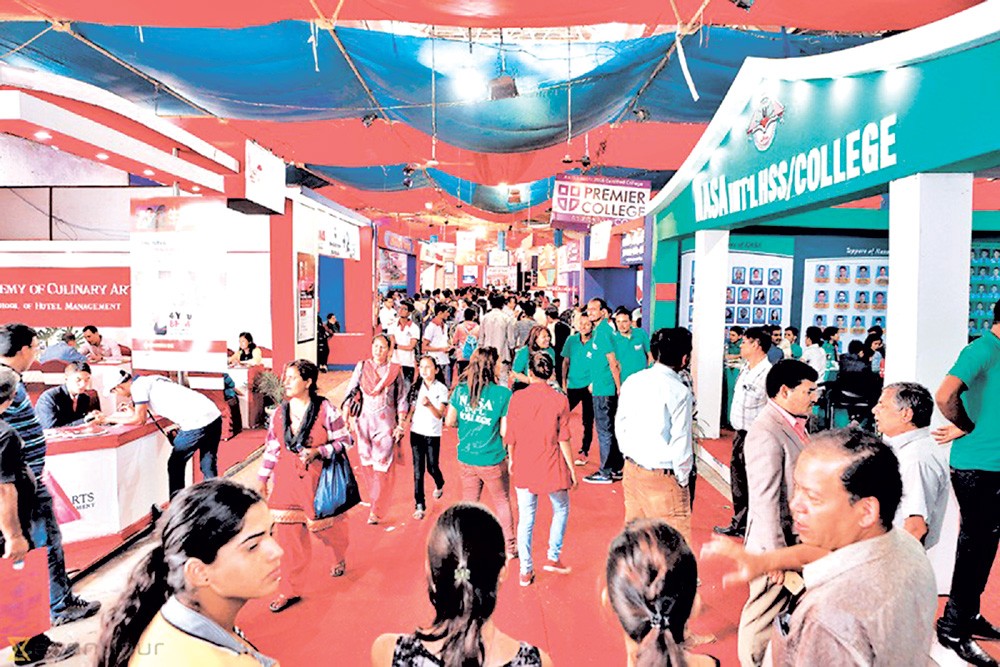Students should be careful about selecting the right one from among a bewildering array of choices
Looking for an appropriate college after the School Leaving Certificate (SLC) exams is a difficult task for both students and parents. Mushrooming Plus Two private colleges in major cities have spread confusion among potential enrolees with each claiming to be one up on the other with regard to infrastructure, facilities and exam results. Catchy advertisements, scholarship schemes, college goodwill, market buzz and admission-oriented counseling make things more bewildering. Students and their guardians need to study the suitability of a college and not be swayed by its name or popularity.
More than 3,500 institutions affiliated with the Higher Secondary Education Board (HSEB) offer higher secondary level (grades 11 and 12) education in different faculties and subjects. Around 40 percent of the SLC graduates enroll in Plus Two colleges in the Kathmandu Valley. They offer a wide variety of subjects in many streams. Around 150 different subjects can be studied under four different faculties—Science, Management, Humanities and Education. Recently introduced options include Agriculture, Music, Applied Beauty, Floriculture, Human Value Education, General Law, Sanskrit and Fine Arts. Students wishing to enrol in grade 11 need to be clear about their aptitude and interest before applying.
Individual care and guidance
Students and their families should also look at the college fees, distance from their homes and the level of individual attention provided. If the field of study the student is interested in is available locally or at a convenient distance, it will not be wise to choose a college in the Capital or other cities since the matter that is taught at all the colleges under the HSEB is the same. One needs to be well convinced about the regularity of the classes held, full-time subject teachers, lab, library, gadgets, internal examinations and study environment at the college. Let’s not discriminate between private and public colleges if they assure quality of education and are within the economic strength of the student’s family.
Similarly, a student’s level and interest will be helpful to find a suitable college. For example, a student with A+ marks does not necessarily have to join the science stream. Likewise, if a student is highly interested in sports, a suitable college would be one with good sports facilities. Hence, a very fair self-evaluation is a must before making the final decision. What is important is whether the college can provide good individual care till the completion of studies. Nowadays, most colleges have attractive buildings, well equipped labs, qualified teachers and sports facilities, but individual care and guidance in a friendly manner is lacking. After a few months of regular classes, many students do not get the kind of care promised before admission. This aspect has a close relation with adolescence issues such as emotions, humiliation and difficulty. Lack of individual attention may lead to dropouts, abnormal activities, drug abuse, frustration and weak performance.
One should not hesitate to ask about scholarship offers; experiences show that students will be charged under unmarked titles
While choosing a suitable college, one has to look at the scholarship schemes offered, external and internal environments, academic history and safety record. One should not hesitate to ask about scholarship offers. Experiences show that students will be charged under unmarked titles. So it is wise to get a clear written proof of the scholarship scheme one is eligible to get. One should not trust the entrance or quota limitation tactics of many colleges. Similarly, the surroundings of a college give a clue whether it is suitable for someone. The past academic record of a college is also worth examining. But large flex banners printed with the photos of exam toppers do not guarantee that newcomers will be the next topper. The intelligence and hard work of a student play a vital role in achieving success. Thus the toppers’ choice cannot and should not be the basis of one’s choice.
Dedication and diligence
Meanwhile, the structural aspect of a college should be examined for safety during disasters like earthquakes. The green stickers fixed to the building today cannot guarantee total safety in the upcoming days. It is also mandatory to consult with seniors, trustworthy teachers and relatives before admission. One should note that the higher secondary level of study is not the end; it is an important means to begin university education and explore the possibilities of a future career. Before taking any decision, students should think hard about their quests and pursuits.
While many students are pressured by parents to follow a certain path or opt for a particular profession, students should opt for what they are comfortable with.
The faculty of the college is very important as teachers are the ones who impart wisdom and value to young minds. Hence, students and guardians should not to run after the hoopla. It is unnecessary to change one’s mind time and again over educational issues; one should make an easy decision with confidence and courage. It is up to the student to pave the way of success. Think that you are right in your choice and pay no more attention to good or bad talk about any college; dedication and hard work in the area of your choice will definitely lead to success.
By Umesh Raj Regmi
The writer is associated with the Nepal Youth Foundation.







